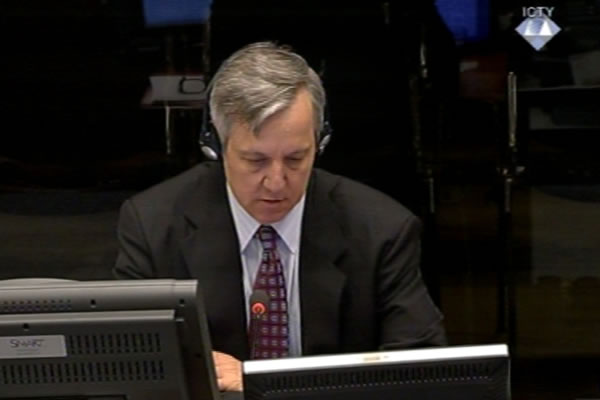Home
‘HONEST MAN’ WHO DIDN’T SPEAK THE TRUTH
The defense counsel showed the minutes from a meeting where Slobodan Milosevic called Ratko Mladic an ‘honest man’. The defense counsel asked the high-ranking UN official Anthony Banbury if he heard other people describe Mladic in similar terms. ‘No, but I heard people say he very often misrepresented the truth'’, the witness replied
 Anthony Banbury, witness at the Ratko Mladic trial
Anthony Banbury, witness at the Ratko Mladic trial In the cross-examination of former UN official who served in the former Yugoslavia, Anthony Banbury, Ratko Mladic’s defense counsel contested the witness’s claims that the Bosnian Serb army was responsible for ‘routine’ killings of civilians in Sarajevo and crimes in other parts of BH. The defense tried to shift the blame on the other side, accusing the BH authorities that they urged the Muslims to leave the territory under the Serb control. According to the defense, the Muslims caused incidents only to blame the Serbs for them.
Defense counsel Miodrag Stojanovic denied that Ratko Mladic and the army under his command were responsible for the ethnic cleansing of large parts of BH. The defense counsel put it to the witness that the ‘process of the migration of the people’ followed a pattern in which civilians would go to the territory under the control of their ethnic army. The witness got the impression that the BH authorities wanted to ‘maintain the multinational character’ of the territory under their control. It was the witness’s impression that the Serb leadership wanted to have a ‘monoethnic’ entity governed by the principle ‘wherever the Serbs boots leave their prints, this is Serb land’.
The defense counsel showed a document from January 1993 in which Hasan Cengic, secretary of the Party of Democratic Action (SDA), demands that all the Muslims from Trebinje – ‘especially the eminent and wealthy members of the community’ – be urged to leave the town, which was under the Serb control and to move to Montenegro. Banbury said this approach was ‘surely worthy of criticism’. He got the impression that in some situations the SDA ‘wanted to manipulate things’, but the UN didn’t work with the party but with the BH authorities, Banbury insisted.
In a bid to blame the sniper incidents in Sarajevo on ‘the other side’, the defense counsel brought up a letter from the BH president Alija Izetbegovic to his military commander Rasim Delic from April 1995. In the letter, Izetbegovic relays to Delic the fact that the French ambassador was unhappy about the allegations that more than half of the 24 UN staff killed in Sarajevo had been the victims of the BH army snipers. The witness replied that he didn’t have specific information but knew that ‘some attacks’ on the UNPROFOR members were indeed carried out by the Bosnian side.
From April 1994 to the spring of 1995, Banbury served as political advisor to Viktor Andreev, UN civil affairs chief, and then to the UN Secretary General’s special envoy to the former Yugoslavia, Yasushi Akashi. In May 1995, Akashi and Banbury met the Serbian president Slobodan Milosevic in Belgrade. In the report from that meeting, Banbury wrote down that Milosevic said Mladic was an ‘honest man who has problems with the Republika Srpska political leadership’. When Banbury was asked if he knew that the phrase ‘a good man’ was often used to describe Mladic and if he heard others say that about Mladic, the witness said he didn’t. The only thing he heard from UNPROFOR officers who had contacts with Mladic was that he was a man who ‘very often misrepresented the truth to them’, Banbury said.
Prosecutor Bibles was obviously all too happy with the outcome of the two days of Banbury’s cross-examination and had no additional questions for him. Banbury thus completed his second testimony before the Tribunal. The trial of Ratko Mladic continues on Monday.
Linked Reports
- Case : Mladic
- 2013-02-07 RATKO MLADIC – CHARMER AND BULLY
- 2013-02-06 CONTESTING SARAJEVO INVESTIGATIONS
- 2013-02-05 WITNESS SPEAKS ABOUT MARKALE ON THE ANNIVERSARY OF MASSACRE
- 2013-02-11 ‘ROSES’ AND ‘PAWS’ ON ASPHALT IN SARAJEVO
- 2013-02-12 POLICE ‘PLANTED’ EVIDENCE
- 2013-02-13 ‘STRATEGIC’ SHELLING OF HOSPITAL
